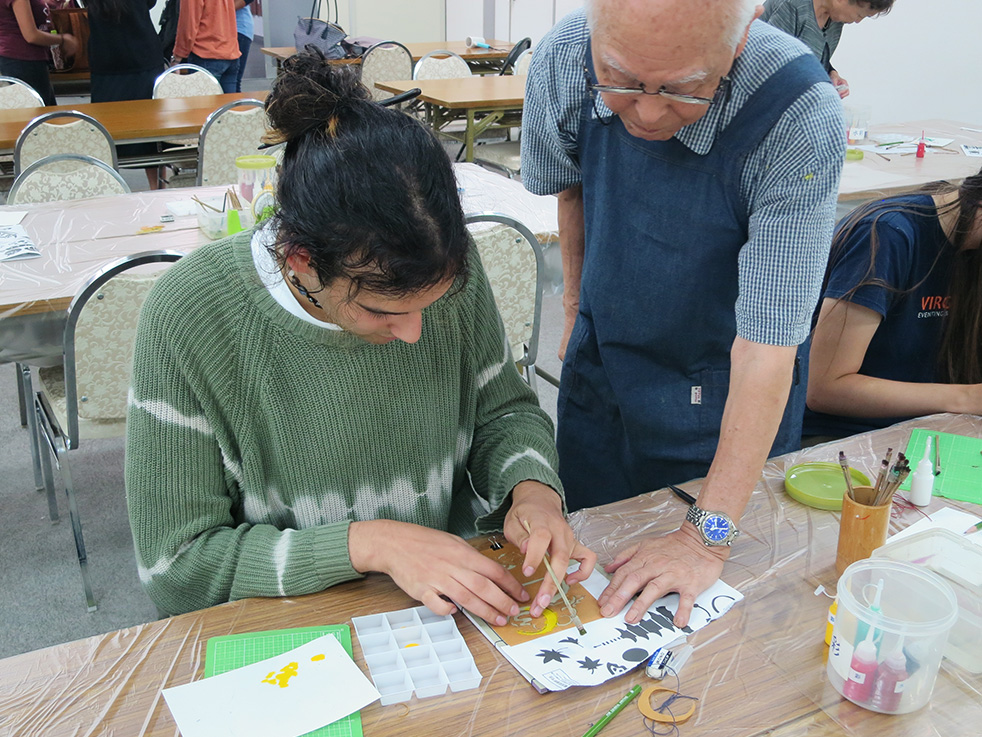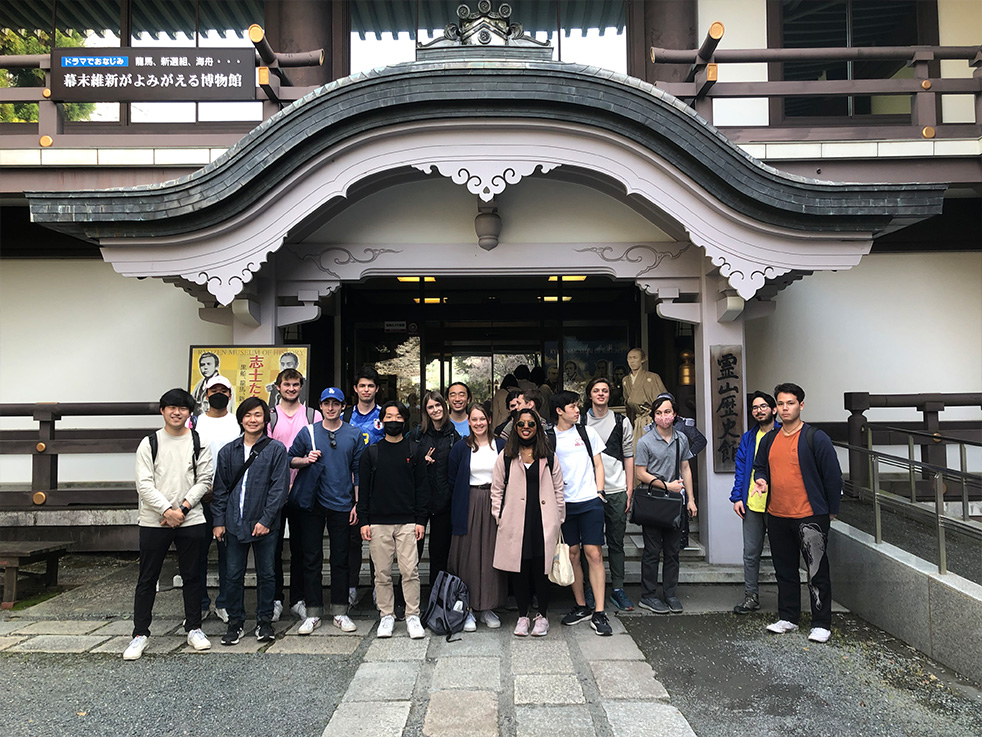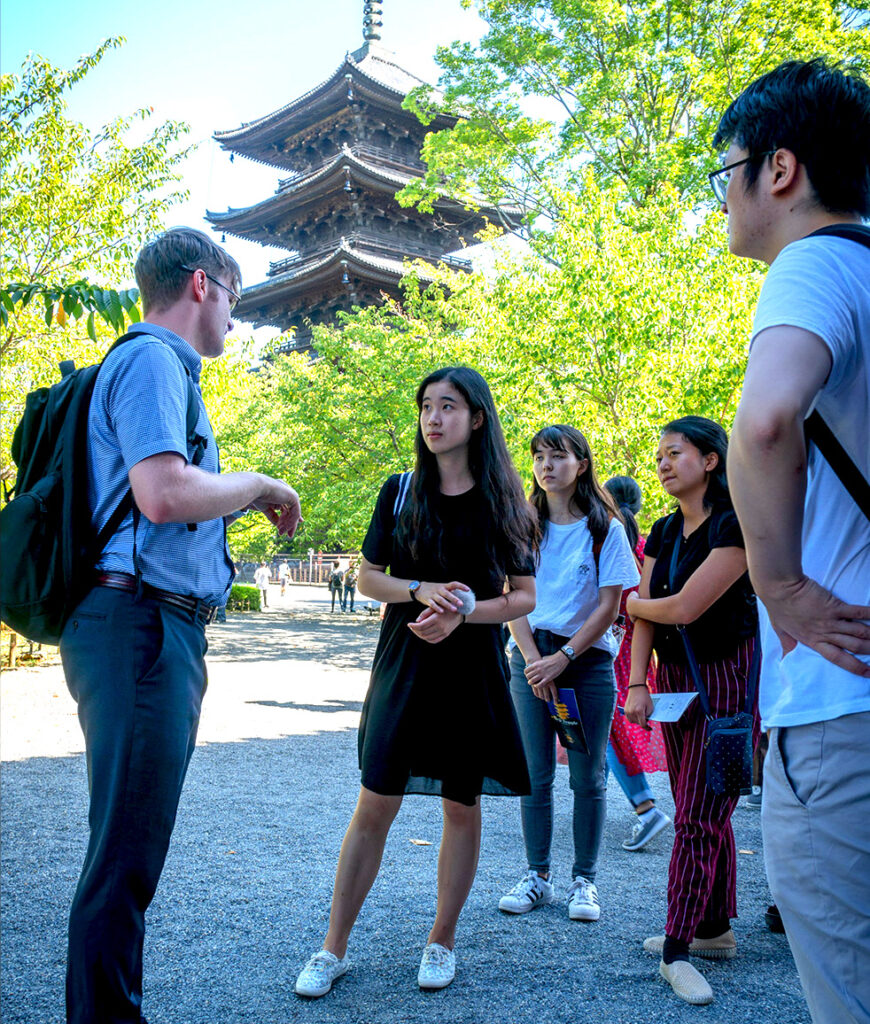Study at KCJS
Features
In addition to your intensive Japanese language courses every morning, KCJS offers a variety of academically rigorous disciplinary courses that are scheduled in the afternoon hours. Each student selects two courses per semester (four points of academic credit per course), which will either meet twice a week for 90 minutes each, or once a week for three hours.
Experiential Learning: The afternoon elective courses provide abundant opportunities for experiential learning through field trips, guest lectures, and in-class demonstrations.



Learn in Japanese: KCJS offers elective courses taught in Japanese. In each semester, these courses focus on different topics for different levels (intermediate and advanced).
Courses to be offered in 2026-2027
KCJS reserves the right to withdraw or modify the courses of instruction or to change the instructors as may become necessary.
Fall 2026 (4 points each. All course numbers begin with: EAAS OC3993:)
- Japanese Modern Architecture (Benoît Jacquet)
- Migration and minorities in contemporary Japan (Miloš Debnár)
- Religious Visual Culture of Japan(Hillary Pedersen)
- Project-based Japanese (Intermediate-level Japanese) (Itsuko Nakamura)
- TBD (KCJS Postdoctoral Fellow)
- TBD (KCJS Postdoctoral Fellow)
- Independent Study
Spring 2027 (4 points each. All course numbers begin with: EAAS OC3993:)
- Japan-US Relations (Thomas French)
- Talking about Japanese Film (Mitsuyo Wada-Marciano)
- Japanese Environment (Aysun Uyar Makibayashi)
- Japanese Buddhism (Intermediate-level Japanese) (Hōyū Ishida)
- Japanese Manga and Anime (Advanced-level Japanese) (Sho Kobayashi)
- TBD (KCJS Postdoctoral Fellow)
- TBD (KCJS Postdoctoral Fellow)
- Independent Study
Courses to be offered in 2025-2026
KCJS reserves the right to withdraw or modify the courses of instruction or to change the instructors as may become necessary.
Fall 2025 (4 points each. All course numbers begin with: EAAS OC3993:)
- Japanese Architecture (Benoît Jacquet)
- Religious Visual Culture of Japan (Hillary Pedersen)
- US-Japan Relations: Power Dynamics, Partnership, and Paradoxes (Yoneyuki Sugita)
- Project-based Japanese (intermediate) (Miyuki Nishimata)
- Project-based Japanese (advanced) (Itsuko Nakamura)
- Childhood,Media, and Japanese Society (Stephen Choi)
- Independent Study
Spring 2026 (4 points each. All course numbers begin with: EAAS OC3993:)
- Japanese Performing Arts (Cody Poulton / Luca Domenico Artuso)
- Kyoto Artisans and their Worlds (Melissa Rinne)
- Talking about Japanese Films (Mitsuyo Wada-Marciano)
- Japanese Buddhism (Intermediate-level Japanese) (Hōyū Ishida)
- Modern Japanese Literature (advanced-level Japanese) (Shigemi Nakagawa)
- Media Imaginations of Traditional Japan (and Kyoto) (Stephen Choi)
- Independent Study
Courses offered in 2024-2025
Fall 2024 (4 points each. All course numbers begin with: EAAS OC3993:)
- Exploring the World of Japanese (Kyoto) Cuisine (Cody Poulton)
- Media Kyoto: Japanese Popular Culture in City Space (Caitlin Casiello)
- Japan and East Asian Regional Environmental Issues (Aysun Uyar Makibayashi)
- Japan and the International Politics of Asia (Haruko Satoh)
- Project-based Japanese (intermediate) (Miyuki Nishimata)
- Project-based Japanese (advanced) (Itsuko Nakamura)
- Independent Study
Spring 2025 (4 points each. All course numbers begin with: EAAS OC3993:)
- Gender and Identity in Japanese History and Culture (Caitlin Casiello)
- Women’s Documentary Film in East Asia (Mitsuyo Wada-Marciano)
- Japanese Architecture (Benoît Jacquet)
- Religious Visual Culture of Japan (Hillary Pedersen)
- Japanese Buddhism (intermediate-level Japanese) (Hōyū Ishida)
- Project-based Japanese (advanced) (Sho Kobayashi)
- Independent Study
Cross Registration for AKP Courses: A limited number of students are allowed to cross register for one elective course offered by the Associated Kyoto Program (AKP) during each semester of the academic year. Grades for these AKP courses will be posted on the KCJS Grade Report.
Independent Study
Independent study allows you to explore a specific research topic in-depth, and acquire the methodological and analytical skills necessary for academic research. It normally involves directed reading and research, regular weekly meetings with a faculty advisor, and completion of a research paper or comparable final project that will be graded by the advisor. Independent study is particularly useful for formulating and gathering materials for a senior or honors thesis. Typically, you would undertake this project in lieu of one of the two regular disciplinary courses.
Many students who plan to write a senior honors thesis at their home institutions have taken advantage of these independent studies as opportunities to collect materials or data that they might otherwise not have access to in the United States. Moreover, you may be able to establish an invaluable network of scholars and experts in your field of interest through an appropriate advisor for your independent study (either the Resident Director or a local faculty member from a university in the Kansai area).
Proposals will be reviewed by the KCJS Resident Director for approval. Students must also obtain approval from their home university study abroad office regarding credit transfer. They should also get written approval from their academic department (usually a faculty member qualified to approve their course of study).
We strongly encourage students to consult their academic advisors at their home institutions to see if they can recommend potential supervisors here in Kyoto or the Kansai region. If students have not yet secured a supervisor, KCJS will make every effort to find one. If KCJS is unable to find a local professor willing and able to supervise the student, the proposal will not be approved.
Click here for a sample list of previous independent study project titles and check the website for a list of courses taught by KCJS professors to get a sense of the range of local expertise on hand.
The application deadline is June 15 for Fall Semester and November 1 for Spring Semester. Students will be notified if their proposal for independent study has been approved prior to their arrival in Japan. Download the Independent Study Proposal fillable form, obtain the relevant signatures as noted on the form, and electronically submit the completed form in your UGE account.


